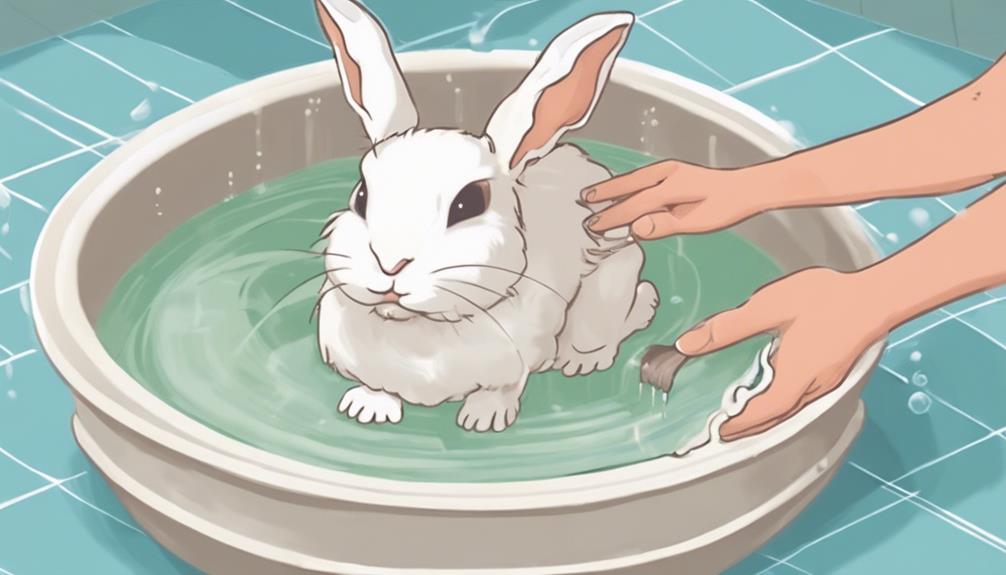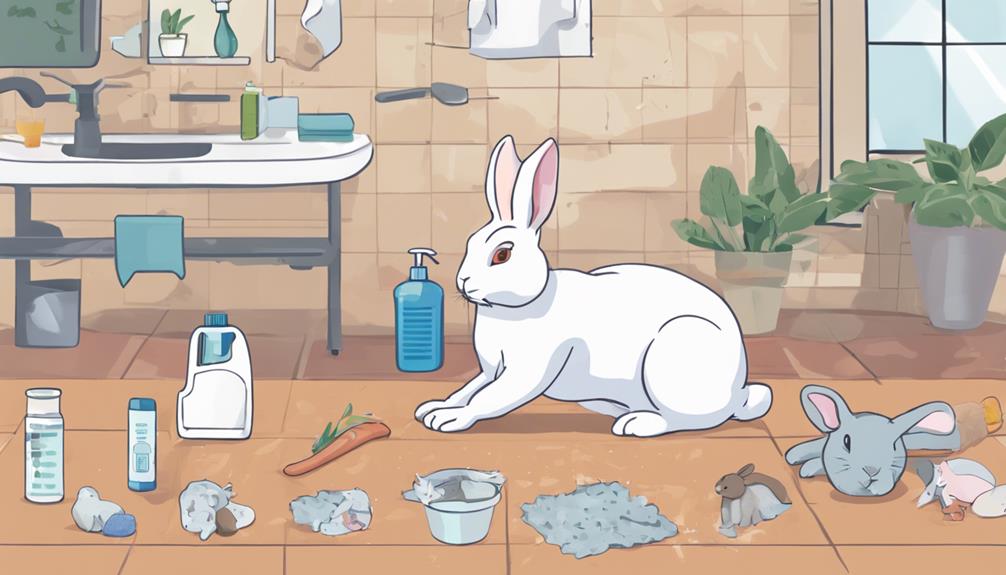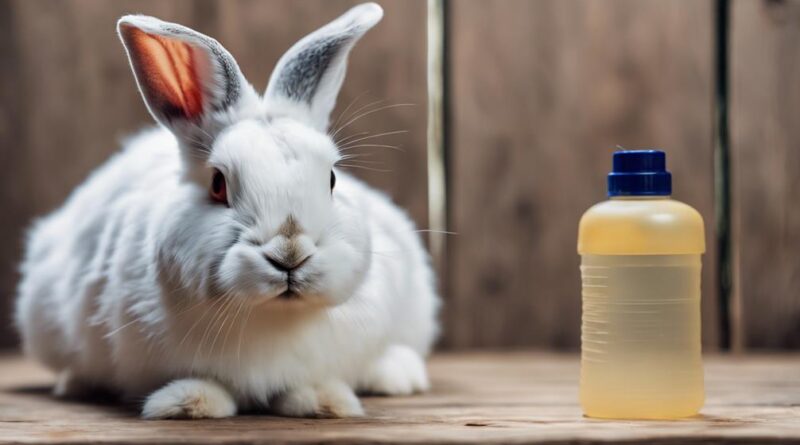Top 10 Hygiene Practices for Healthy Rabbits
To keep your rabbits healthy, follow these top 10 hygiene practices: Establish a regular grooming routine for fur health. Maintain a clean living environment and litter train them. Trim their nails carefully with pet nail clippers. Check their ears regularly for signs of infection. Feed a balanced diet rich in fiber for good dental health. Monitor their digestive health through droppings. Bathing should be done sparingly with rabbit-safe products. Handle them gently and prevent parasites with regular cleaning. Lastly, schedule regular vet check-ups for expert advice. Mastering these practices ensures your rabbits stay happy and healthy.
Regular Grooming Routine
To keep your rabbit's fur healthy and clean, establish a regular grooming routine that includes brushing and checking for any signs of matted fur or skin issues. Brushing is essential for maintaining your rabbit's coat health and preventing mats. When it comes to brushing techniques, use a soft-bristled brush or a slicker brush to gently remove loose fur and prevent tangles. Start by brushing in the direction of hair growth, especially in areas where your rabbit's fur is prone to matting, such as behind the ears and under the chin.
Shedding control is also a crucial part of your rabbit's grooming routine. During shedding seasons, which typically occur in the spring and fall, increase the frequency of brushing to help remove loose fur and prevent it from matting. Regular grooming not only keeps your rabbit looking neat but also helps prevent hairballs, which can be harmful if ingested.
In addition to brushing, regularly check your rabbit's fur for any signs of matted fur or skin issues. Mats can pull on your rabbit's skin, causing discomfort and potentially leading to skin infections. If you notice any mats, gently try to separate them with your fingers or a comb designed for removing mats. However, if the mats are too severe, it's best to seek professional help to prevent causing harm to your rabbit's delicate skin. By incorporating these grooming practices into your routine, you can ensure your rabbit stays clean, comfortable, and healthy.
Clean Living Environment
Maintaining a clean living environment for your rabbit is paramount for their overall health and well-being. Proper cage hygiene is essential in preventing diseases and ensuring a comfortable space for your furry friend. Regularly clean your rabbit's cage by removing any uneaten food, soiled bedding, and droppings. Consider using a pet-safe disinfectant to wipe down the cage surfaces to eliminate harmful bacteria.
Litter training your rabbit can also help in keeping their living area clean. Place a litter box in the cage and fill it with rabbit-safe litter. Encourage your rabbit to use the litter box by placing some of their droppings in it. Be patient and consistent with training, rewarding your rabbit with treats when they use the litter box correctly.
When it comes to cleaning supplies, opt for gentle products that are safe for your rabbit. Avoid harsh chemicals that can be harmful if ingested or inhaled. Vinegar and water solutions are effective and safe for cleaning your rabbit's living space. Additionally, consider using baking soda to help control odors in the cage.
Maintaining a fresh and clean living environment for your rabbit not only promotes their health but also enhances their quality of life. By following these hygiene practices, you can ensure that your rabbit thrives in a clean and comfortable living space.
Proper Nail Trimming
Proper nail trimming is essential for maintaining your rabbit's overall health and well-being. Nail care is a crucial aspect of rabbit hygiene as overgrown nails can cause discomfort and lead to health issues. When it comes to nail care for your rabbit, there are important trimming tips to keep in mind.
To trim your rabbit's nails, you'll need a pair of small, sharp nail clippers designed for pets. It's important to have styptic powder on hand in case you accidentally trim the nails too short and cause bleeding. Before you start, get your rabbit accustomed to having their paws handled by gently touching and massaging their feet. This will help reduce stress during the nail trimming process.
When trimming your rabbit's nails, make sure to avoid cutting into the quick, which is a vein inside the nail. The quick is visible in light-colored nails but may be more challenging to see in dark-colored nails. It's safer to trim small amounts at a time to prevent cutting the quick. If you're unsure or uncomfortable trimming the nails yourself, seek guidance from a veterinarian or a professional groomer who can demonstrate the proper technique.
Regular nail care is essential for keeping your rabbit healthy and happy.
Regular Ear Checks
Regularly checking your rabbit's ears is a fundamental aspect of their grooming routine to ensure overall health and well-being. Ear mites prevention is crucial for maintaining good ear health in rabbits. These tiny parasites can cause irritation, inflammation, and even infections if left untreated. To prevent ear mites, inspect your rabbit's ears regularly for any signs of dark, crumbly discharge or excessive scratching. If you suspect ear mites, consult your veterinarian for proper treatment options.
Proper cleaning of your rabbit's ears is essential to prevent ear infections. Use a damp cotton ball or a soft cloth to gently wipe the outer ear and remove any dirt or debris. Avoid inserting anything into the ear canal as it can cause damage. If you notice any redness, swelling, foul odor, or discharge from the ears, it could indicate an ear infection. In such cases, seek veterinary advice promptly to prevent the infection from worsening.
Regular ear checks not only help in maintaining good hygiene but also allow you to monitor your rabbit's ear health closely. By being proactive and attentive to any changes in your rabbit's ears, you can ensure early detection of potential issues and provide timely care to keep your furry friend healthy and happy.
Balanced Diet for Dental Health
Ensuring your rabbit's dental health thrives on a balanced diet rich in essential nutrients and appropriate textures to support their natural chewing habits is crucial. Dental health is of utmost importance for rabbits, as dental problems can lead to pain, difficulty eating, and even systemic health issues. A diet that promotes dental health can prevent many of these issues, making it a key aspect of your rabbit's overall well-being.
The dietary impact on dental health is significant. Rabbits need a diet high in fiber to promote natural wear of their teeth as they chew. Hay is an essential component of their diet, as the coarse texture helps grind down their ever-growing teeth. Additionally, providing fresh vegetables and limited pellets can also contribute to dental health by offering a variety of textures for chewing.
Preventing dental problems through diet is more effective than treating them once they arise. By offering a balanced diet that meets your rabbit's nutritional needs and supports their dental health, you can help prevent issues such as overgrown teeth, malocclusion, and dental abscesses. Regularly monitoring your rabbit's eating habits and ensuring they've access to the right foods can go a long way in maintaining their dental health.
Monitoring Droppings
To maintain your rabbit's overall health, it's important to observe and monitor their droppings regularly. By paying attention to your rabbit's droppings, you can gain valuable insights into their digestive health, hydration levels, and overall well-being. One key aspect to monitor is the consistency of the droppings. Healthy rabbit droppings should be round, dry, and firm. Any changes in consistency could indicate potential issues such as dehydration or an improper diet.
Moreover, monitoring your rabbit's droppings can help you detect early signs of digestive problems. Any sudden changes in the size, color, or frequency of droppings may signal an underlying health issue that requires attention from a veterinarian. It's essential to keep track of your rabbit's droppings, especially when introducing new foods into their diet. Dietary changes can impact the digestive system, leading to variations in droppings.
In addition to consistency, the quantity of droppings is also crucial. A decrease in the number of droppings could suggest a decrease in food intake or a gastrointestinal problem. On the other hand, an increase in droppings might indicate overfeeding. By regularly monitoring your rabbit's droppings and being attentive to any changes, you can ensure they maintain optimal digestive health and overall well-being.
Bathing When Necessary

When your rabbit's fur becomes soiled or dirty, bathing may be necessary to maintain their hygiene and overall health. However, rabbits generally don't require frequent baths as they're meticulous groomers themselves. The frequency of bathing should be kept to a minimum, ideally only when your rabbit has soiled their fur in a way that can't be cleaned through grooming.
When bathing your rabbit, ensure that the water temperature is lukewarm, as water that's too hot or too cold can cause stress or shock to your rabbit. Use a small amount of mild rabbit-safe shampoo to clean their fur, making sure to avoid their eyes, ears, and nose. Gently massage the shampoo into their fur and then thoroughly rinse to remove all traces of soap.
After the bath, it's important to dry your rabbit completely to prevent them from getting chilled. Use a towel to gently pat their fur dry, avoiding vigorous rubbing that can cause stress. You can also use a hairdryer on a low, cool setting from a distance to help speed up the drying process, but always ensure it isn't too hot or close to your rabbit's sensitive skin.
Proper Handling Techniques
When handling your rabbit, it's important to be gentle and confident to ensure their comfort and safety. Safe handling practices are crucial to prevent injuries to your rabbit and yourself. Approach your rabbit calmly and avoid sudden movements that could startle them. Support their body securely but gently, ensuring they feel safe in your hands. When lifting your rabbit, one hand should support their hindquarters, and the other hand should support their chest. This technique helps distribute their weight evenly and prevents unnecessary stress on their spine.
Gentle restraint is key to successful handling. If you need to restrain your rabbit for grooming or medical purposes, do so with care. Wrapping them lightly in a towel can help keep them calm and prevent them from squirming. Avoid putting pressure on their chest or abdomen, as this can cause discomfort and make them feel trapped. Always approach handling with a calm and positive attitude, as rabbits are sensitive animals that pick up on human emotions.
Preventing Parasite Infestations

Implementing a comprehensive preventive strategy is essential in safeguarding your rabbit against parasite infestations. Parasites can cause discomfort and serious health issues for your furry friend, so taking proactive measures is crucial. Here are some key points to consider:
- Regular Cleaning: Maintain a clean living environment for your rabbit by regularly cleaning their hutch or living space. This can help reduce the risk of parasites taking hold.
- Proper Hygiene: Ensure your rabbit is clean and groomed regularly. Bathing them too frequently can strip their skin of natural oils, so opt for gentle grooming instead.
- Preventive Measures: Consult with your vet to establish a preventive parasite control plan. This may include treatments like spot-on solutions or oral medications to prevent infestations.
- Natural Remedies: Explore natural remedies that can help repel parasites. For example, diatomaceous earth can be sprinkled in your rabbit's living space as a natural way to deter pests.
Regular Vet Check-Ups
Regular vet check-ups are crucial to maintaining your rabbit's health and detecting any potential issues early on. When it comes to your rabbit's well-being, a veterinarian specializing in exotic pets can provide essential guidance on dietary requirements and dental care. Rabbits have specific dietary needs, requiring a high-fiber diet primarily composed of hay, supplemented with fresh vegetables and a small amount of pellets. A vet can evaluate your rabbit's current diet, ensuring it meets these nutritional requirements and adjusting it if necessary to prevent health issues such as obesity or gastrointestinal problems.
Dental care is another critical aspect that a vet will assess during check-ups. Rabbits' teeth continuously grow, and without proper wear, they can develop dental problems. A vet can examine your rabbit's teeth for overgrowth, malocclusion, or other issues that may affect their ability to eat and lead to discomfort. Additionally, they can provide advice on proper chew toys and techniques to help maintain your rabbit's dental health between check-ups.
Frequently Asked Questions
Can Rabbits Use Cat Litter for Their Living Environment?
Yes, rabbits can use cat litter for their living environment, but it's crucial to choose a safe litter alternative that prioritizes absorbency.
Some types of cat litter, like those made of clay or clumping materials, may not be suitable for rabbits due to ingestion risks.
Proper litter box training is essential, along with regular cleaning to maintain odor control and ensure your rabbit's health and comfort.
How Often Should I Clean My Rabbit's Bedding?
You should clean your rabbit's bedding regularly to maintain hygiene and control odors. Aim to clean the bedding at least once a week, but if you notice any strong odors or soiling, consider cleaning it more frequently.
Some alternatives for odor control include using absorbent materials like hay or straw, as well as spot cleaning daily to remove any soiled areas.
Prioritize your rabbit's comfort and health by staying on top of bedding maintenance.
Should I Trim My Rabbit's Nails if They Are Outdoor Pets?
If your rabbits are outdoor pets, nail trimming is even more crucial due to the increased risks they face outside. Regular nail trimming helps prevent overgrowth, splitting, or injuries.
Use specialized nail clippers designed for small animals and ensure you have styptic powder on hand in case of accidental bleeding. To make the process easier, get your rabbits accustomed to nail trims gradually and reward them with treats for cooperation.
Can I Use Regular Human Nail Clippers for Nail Trimming?
Yes, using regular human nail clippers for trimming your rabbit's nails isn't recommended. It's crucial to use the proper tools designed for small animal nail trimming to avoid injury and ensure a clean cut.
Nail trimming alternatives like guillotine-style clippers or nail grinders are safer and more effective for rabbits. These tools provide better precision and reduce the risk of accidentally cutting the quick, which can cause pain and bleeding.
Are There Specific Fruits and Vegetables That Improve Dental Health for Rabbits?
When it comes to improving dental health for rabbits, specific fruits and vegetables can be beneficial. Incorporating dental treats like apple slices, carrots, and leafy greens can help maintain healthy teeth by promoting chewing and grinding.
Additionally, providing chew toys made of safe materials can also aid in keeping your rabbit's teeth in good shape. Ensuring a balanced diet with these dental-friendly options can contribute to your rabbit's overall oral health.
Conclusion
In conclusion, maintaining proper hygiene practices is essential for the overall health and well-being of your rabbit. By establishing a regular grooming routine, keeping their living environment clean, and providing a balanced diet, you can help prevent common health issues and ensure their happiness.
Remember to also trim their nails, check their ears, and schedule regular vet check-ups to catch any potential problems early.
Your rabbit will thank you for the extra care and attention!
